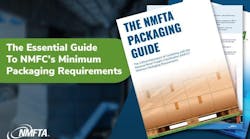A settlement between the Federal Motor Carrier Safety Administration (FMCSA) and three trucking associations suing the agency over its new Compliance, Safety, Accountability (CSA) program is going to result in some changes to the language and symbols used within the regulations.
The National Association of Small Trucking Companies, Inc. (NASTC), the Expedite Alliance of North America (TEANA) and the Air & Expedited Motor Carriers Association (AEMCA) filed suit Nov. 29 last year, and as part of the settlement, FMCSA is making changes by March 25 to CSA’s Safety Measurement System (SMS) public website regarding the display of motor carrier safety performance information.
Those changes include replacing the “ALERT” symbol currently displayed in orange on the SMS website with a yellow symbol of a triangle and exclamation point and revising SMS disclaimer language, the agency said.
The new disclaimer language will read as follows: “The data in the Safety Management System (SMS) is performance data used by the agency and enforcement community. A symbol, based on that data, indicates that FMCSA may prioritize a motor carrier for further monitoring. The symbol is not intended to imply any federal safety rating of the carrier pursuant to 49 USC 31144. Readers should not draw conclusions about a carrier’s overall safety condition simply based on the data displayed in this system. Unless a motor carrier in the SMS has received an UNSATISFACTORY safety rating pursuant to 49 CFR Part 385, or has otherwise been ordered to discontinue operations by the FMCSA, it is authorized to operate on the nation’s roadways.”
The three trucking associations said they sought to postpone publication of percentile rankings and “ALERT” designations for carriers, arguing in their court filing that the SMS methodology was a work in progress intended for the agency’s own use, but that shippers and brokers were misconstruing the data as a new “de facto” safety rating system –- which could result in what the groups described as “blackballing” potentially 57% of the ranked carriers in the SMS database which had one or more “ALERT.”
“We believe these changes will disabuse shippers and brokers of the misconception that SMS methodology, percentile rankings of carriers, and monitoring thresholds are intended for their use in determining carrier fitness,” said Henry Seaton, one of the lawyers representing the trucking, in a statement.


